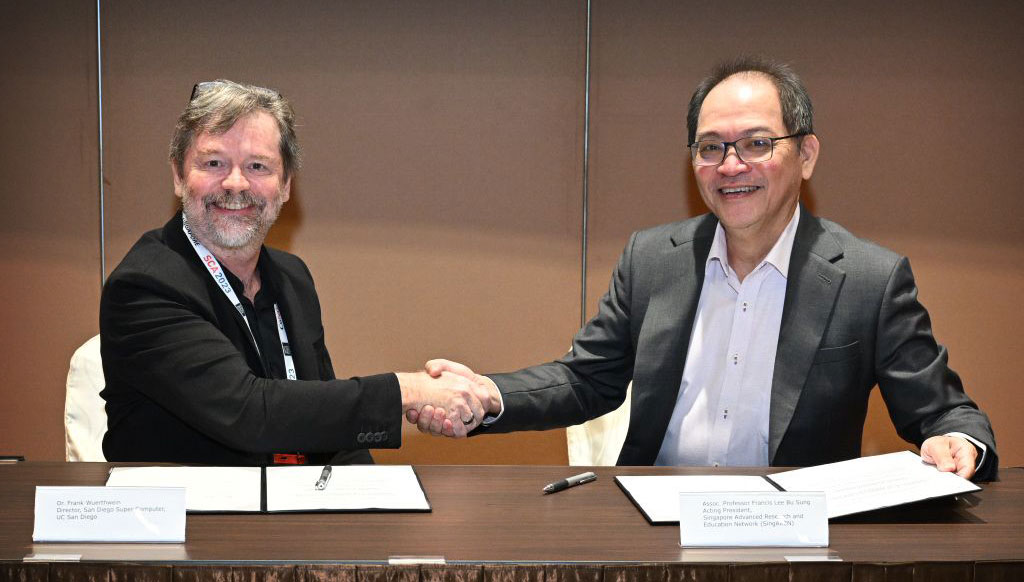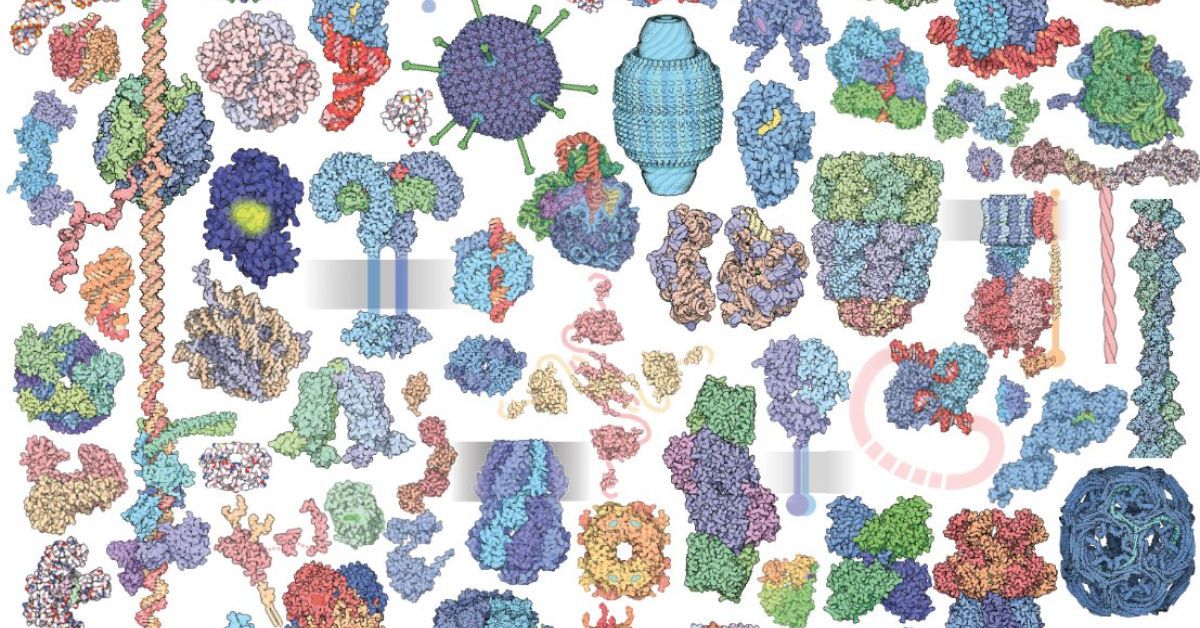San Diego Supercomputer Center and SingAREN Commit to Improving Data Access for Researchers in Asia
Joint effort is expected to accelerate regional scientific discovery, education and innovation
Story by:
Published Date
Article Content
The San Diego Supercomputer Center (SDSC) at the University of California San Diego and the Singapore Advanced Research and Education Network (SingAREN) in Singapore are giving the research community in Asia a big boost with a technology tool to advance scientific discovery in the region.
During the recent SupercomputingAsia 2023 conference, the two organizations announced their signing of a Memorandum of Understanding (MOU) to work toward deploying in the sovereign island/city-state a data cache – a data block for storing information for easy re-access. SDSC will contribute a high-performance server that will be hosted at the SingAREN Open Exchange, located at Equinix SG3. SingAREN will provide the high-speed international connectivity for the server in the region.
Deploying the cache server at SingAREN will provide researchers in Asia – particularly those working in the fields of genomics, climate science and materials science – with faster and more efficient access to data. This in turn will enable quicker and more efficient cutting-edge research and discoveries.
“The deployment of the server is a major milestone for making open data more accessible to researchers in the region, Asia and Oceania. SingAREN is happy to work in partnership with SDSC to make this service available to the community,” said SingAREN’s Acting President Professor Francis Lee Bu Sung.
Over the next three years, the two organizations will actively work together in support of the Open Science Data Federation and the Research Collaboratory for Structural Bioinformatics Protein Data Bank (RCSB PDB) – a leading global resource for macromolecular experimental data, integral to scientific discovery across a multitude of disciplines – to ensure fast and easy access to the cache server for researchers in Asia and Oceania.
“The Open Science Data Federation supports the notion of ‘data origins’ that host data and ‘data caches’ via which data is accessed. Together they implement the notion of ‘any data, anytime, anywhere’, supporting open science with open data globally,” said SDSC Director Frank Würthwein.

SDSC Director Frank Würthwein (left) and SingAREN’s Acting President Francis Lee Bu Sung shake hands during the signing of the MOU in Singapore. Photo courtesy of SingAREN
About half of the global traffic to rcsb.org [the research-focused web portal of the RCSB PDB, which operates the U.S. data center of the Worldwide PDB (wwPDB) partnership], originates from Asia and Oceania – highlighting significant demand for data access in the region, according to Stephen K. Burley, RCSB PDB director/principal investigator.
“Deployment of an RCSB.org data cache in Singapore will benefit researchers in the region with faster access to data, streamlining data delivery and alleviating congestion on servers in the U.S.,” said Burley. “The cache will complement data delivery provided by wwPDB data centers in Osaka, Japan (Protein Data Bank Japan), Shanghai, People’s Republic of China (Protein Data Bank China) and Hinxton, United Kingdom (Protein Data Bank in Europe),” added Burley.
Jose Duarte, who manages the PDB site at SDSC, said: “RCSB PDB is headquartered at Rutgers, The State University of New Jersey, with additional performance sites at SDSC (UC San Diego) and UC San Francisco, running parallel data centers in both coasts at Rutgers and SDSC. The new Singapore deployment will add to its capacity, enabling lower latency data access and efficiency gains for the Asian and global biomedical research communities.”
According to SDSC and SingAREN, the signing of the MOU marks a significant step forward in their partnership and underscores their shared commitment to supporting the scientific community to advance scientific discovery through technology.
About the partners:
San Diego Supercomputer Center (SDSC) at the University of California San Diego is a leader in high-performance and data-intensive computing and cyberinfrastructure. SDSC provides resources, services and expertise to the local, regional and national research community, including industry and academia, supporting hundreds of multidisciplinary programs across a wide variety of domains. Established in 1985 with support from the National Science Foundation, SDSC was one of the first supercomputer centers in the United States. SDSC's history includes pioneering advances in data storage and cloud computing from which have emerged several Centers of Excellence in the areas of large-scale data management, predictive analytics, health IT services, workflow automation and internet analysis. For more information, please visit www.sdsc.edu.
SingAREN is Singapore's National Research and Education (R&E) Network and the sole provider of local and international networks dedicated to serving the R&E community in Singapore. SingAREN facilitates high-speed transfers of large datasets, both domestically and across international boundaries, for scientific research and enables advanced network technology demonstrations through its resilient links and high-speed fibre network. The SingAREN Open Exchange (SOE) interconnects Singapore’s R&E community to the R&E networks in other countries, including Asia, Australia, Europe and the U.S. For more information, please visit www.singaren.net.sg.
Protein Data Bank has an archive that currently houses more than 200,000 experimentally-determined 3D structures of proteins, DNA and RNA that are freely available with no limitations on usage. The archive is jointly managed by the Worldwide Protein Data Bank partnership, involving data centers in the United States, Europe and Asia. The U.S. data center is operated by the RCSB PDB at Rutgers, the San Diego Supercomputer Center at the University of California San Diego, and UC San Francisco. RCSB PDB Core Operations are funded by the National Science Foundation (DBI-1832184), the U.S. Department of Energy (DE-SC0019749), and the National Cancer Institute, National Institute of Allergy and Infectious Diseases, and National Institute of General Medical Sciences of the National Institutes of Health (grant no. R01GM133198).
Share This:
Stay in the Know
Keep up with all the latest from UC San Diego. Subscribe to the newsletter today.




